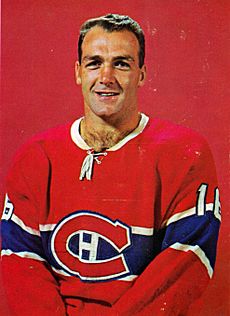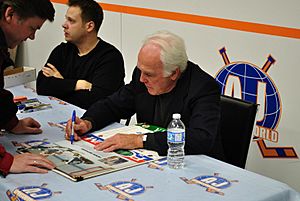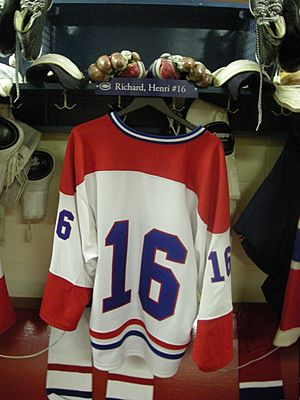Henri Richard facts for kids
Quick facts for kids Henri Richard |
|||
|---|---|---|---|
| Hockey Hall of Fame, 1979 | |||

Richard with the Montreal Canadiens in the 1960s
|
|||
| Born | February 29, 1936 Montreal, Quebec, Canada |
||
| Died | March 6, 2020 (aged 84) Laval, Quebec, Canada |
||
| Height | 5 ft 7 in (170 cm) | ||
| Weight | 160 lb (73 kg; 11 st 6 lb) | ||
| Position | Centre | ||
| Shot | Right | ||
| Played for | Montreal Canadiens | ||
| Playing career | 1955–1975 | ||
Joseph Henri Richard (born February 29, 1936 – died March 6, 2020) was a Canadian professional ice hockey player. He played as a centre for the Montreal Canadiens in the National Hockey League (NHL). His career lasted from 1955 to 1975.
Henri was nicknamed "Pocket Rocket". This was because his older brother, Maurice Richard, was a famous Canadiens player known as "Rocket Richard". Both brothers are in the Hockey Hall of Fame. Henri Richard won the Stanley Cup 11 times as a player. This is the most Stanley Cup wins in NHL history. He shares the record for most championships won by an athlete in a North American sports league with Bill Russell from basketball. In 2017, Henri Richard was named one of the '100 Greatest NHL Players' of all time.
Contents
Growing Up: Henri Richard's Early Life
Henri Richard was born on February 29, 1936, in Montreal, Quebec, Canada. He was the seventh of eight children in his family. His father worked for the Canadian Pacific Railway.
Henri's older brother, Maurice Richard, started playing hockey for the Montreal Canadiens in 1942. Henri was only six years old then. Maurice quickly became a huge star, earning the nickname "Rocket Richard". Henri wanted to be just like his brother and play hockey too.
Henri joined the junior Montreal Canadiens team when he was 15. He led the QMJHL in scoring for two years in a row. After this success, he moved up to play in the NHL.
Henri Richard's Amazing Playing Career
Henri Richard started his professional career playing on the same team as his famous older brother. People often compared him to Maurice. He got the nickname "Pocket Rocket" when he was still a junior player. This was a nod to his brother's "Rocket Richard" nickname. It also showed that Henri was shorter than his brother.
The two Richard brothers had very different playing styles. Maurice Richard was known for his powerful drives towards the net. Henri Richard, however, preferred smart plays and outthinking his opponents. Maurice shot with his left hand, while Henri shot with his right. Maurice was a goal scorer, the first to score 50 goals in 50 games. He led the league in goals five times. Henri, on the other hand, led the league in assists twice, in 1957–58 and 1962–63. Maurice was strong, but Henri was fast. Despite their differences, both brothers were tough and willing to play physically on the ice.
At first, Montreal Canadiens coach Toe Blake kept the brothers on separate lines. He worried that Maurice would pass up scoring chances for his younger brother. But during one game against Chicago, injuries forced Blake to play the Richard brothers together. Henri helped Maurice score a goal in the third period. After that, the coach often played them together with Dickie Moore.
Maurice used to look out for Henri on the ice. He would go after anyone who bothered his younger brother. But one time, Henri won a fight while Maurice was in the penalty box. Maurice then realized his brother could handle himself. Toe Blake later said that playing with Henri made Maurice a better player. It also helped Maurice play longer in his career. In 1958, when Maurice Richard was injured, Henri's line kept scoring goals. This showed everyone that Henri was a star on his own.
The Canadiens won the Stanley Cup in each of Henri Richard's first five seasons. This is the longest championship streak in NHL history. Maurice Richard retired after the last of these titles in 1960. But even before then, Henri Richard was seen as a star in his own right. He was named to the first All-Star team in 1957–58. He was also named to the second All-Star team in 1959, 1961, and 1963.
Henri scored the goal that won the Stanley Cup in the 1966 Stanley Cup Finals. This happened in overtime of Game Six against the Detroit Red Wings. The puck bounced off Henri's body and into the net. In the 1971 Stanley Cup Finals, Richard scored both the game-tying and the Stanley Cup-winning goals in Game Seven. This was against the Chicago Blackhawks.
Like his older brother, Henri Richard spoke up for what he believed in. He was especially vocal about unfair treatment towards French Canadians. In the 1971 final, Henri was benched in Game 5. This happened after he said in an interview that coach Al MacNeil was unfair to French-speaking players. Even though the Canadiens won the Stanley Cup, MacNeil was moved to coach a junior team. After captain Jean Béliveau retired, Henri Richard became the team captain. MacNeil and Richard later became friends again.
Retirement and Lasting Legacy
Henri Richard was the captain of the Canadiens from 1971 until he retired in 1975. His team was eliminated from the playoffs by the Buffalo Sabres that year. He was the ninth player in NHL history to reach 1,000 career points. He scored 358 goals and made 688 assists in 1,256 games. His 1,256 regular-season games played for the Canadiens is a team record.
Henri won the Stanley Cup 11 times as a player. This is the most in NHL history. Only one other athlete in North American professional sports has won eleven championships in their league. That person is Bill Russell of the NBA's Boston Celtics. Henri also scored two Stanley Cup-winning goals. Only five players have done this.
He always wore the number 16. The Canadiens retired his number on December 10, 1975, to honor him. Henri insisted that the money from his jersey retirement night be given to build a gym for an orphanage. He was elected to the Hockey Hall of Fame in 1979. In 1998, he was ranked number 29 on The Hockey News' list of the 100 Greatest Hockey Players. He later worked as an ambassador for the Canadiens team.
In 2015, it was announced that Richard had Alzheimer's disease. He passed away on March 6, 2020, at the age of 84. He died in Laval, Quebec, due to complications from the disease.
Career Statistics
Regular Season and Playoffs
| Regular season | Playoffs | |||||||||||||
|---|---|---|---|---|---|---|---|---|---|---|---|---|---|---|
| Season | Team | League | GP | G | A | Pts | PIM | GP | G | A | Pts | PIM | ||
| 1951–52 | Montreal Nationale | QJHL | 49 | 23 | 32 | 55 | 35 | 4 | 1 | 0 | 1 | 0 | ||
| 1952–53 | Montreal Nationale | QJHL | 46 | 27 | 36 | 63 | 55 | 7 | 4 | 5 | 9 | 4 | ||
| 1952–53 | Montreal Royals | QSHL | 1 | 0 | 0 | 0 | 0 | — | — | — | — | — | ||
| 1953–54 | Montreal Jr. Canadiens | QJHL | 54 | 56 | 53 | 109 | 85 | 7 | 6 | 7 | 13 | 6 | ||
| 1954–55 | Montreal Jr. Canadiens | QJHL | 44 | 33 | 33 | 66 | 65 | 4 | 3 | 1 | 4 | 2 | ||
| 1955–56 | Montreal Canadiens | NHL | 64 | 19 | 21 | 40 | 46 | 10 | 4 | 4 | 8 | 21 | ||
| 1956–57 | Montreal Canadiens | NHL | 63 | 18 | 36 | 54 | 71 | 10 | 2 | 6 | 8 | 10 | ||
| 1957–58 | Montreal Canadiens | NHL | 67 | 28 | 52 | 80 | 56 | 10 | 1 | 7 | 8 | 11 | ||
| 1958–59 | Montreal Canadiens | NHL | 63 | 21 | 30 | 51 | 33 | 11 | 3 | 8 | 11 | 13 | ||
| 1959–60 | Montreal Canadiens | NHL | 70 | 30 | 43 | 73 | 66 | 8 | 3 | 9 | 12 | 9 | ||
| 1960–61 | Montreal Canadiens | NHL | 70 | 24 | 44 | 68 | 91 | 6 | 2 | 4 | 6 | 22 | ||
| 1961–62 | Montreal Canadiens | NHL | 54 | 21 | 29 | 50 | 48 | — | — | — | — | — | ||
| 1962–63 | Montreal Canadiens | NHL | 67 | 23 | 50 | 73 | 57 | 5 | 1 | 1 | 2 | 2 | ||
| 1963–64 | Montreal Canadiens | NHL | 66 | 14 | 39 | 53 | 73 | 7 | 1 | 1 | 2 | 9 | ||
| 1964–65 | Montreal Canadiens | NHL | 53 | 23 | 29 | 52 | 43 | 13 | 7 | 4 | 11 | 24 | ||
| 1965–66 | Montreal Canadiens | NHL | 62 | 22 | 39 | 61 | 47 | 8 | 1 | 4 | 5 | 2 | ||
| 1966–67 | Montreal Canadiens | NHL | 65 | 21 | 34 | 55 | 28 | 10 | 4 | 6 | 10 | 2 | ||
| 1967–68 | Montreal Canadiens | NHL | 54 | 9 | 19 | 28 | 16 | 13 | 4 | 4 | 8 | 4 | ||
| 1968–69 | Montreal Canadiens | NHL | 64 | 15 | 37 | 52 | 45 | 14 | 2 | 4 | 6 | 8 | ||
| 1969–70 | Montreal Canadiens | NHL | 62 | 16 | 36 | 52 | 61 | — | — | — | — | — | ||
| 1970–71 | Montreal Canadiens | NHL | 75 | 12 | 37 | 49 | 46 | 20 | 5 | 7 | 12 | 20 | ||
| 1971–72 | Montreal Canadiens | NHL | 75 | 12 | 32 | 44 | 48 | 6 | 0 | 3 | 3 | 4 | ||
| 1972–73 | Montreal Canadiens | NHL | 71 | 8 | 35 | 43 | 21 | 17 | 6 | 4 | 10 | 14 | ||
| 1973–74 | Montreal Canadiens | NHL | 75 | 19 | 36 | 55 | 28 | 6 | 2 | 2 | 4 | 2 | ||
| 1974–75 | Montreal Canadiens | NHL | 16 | 3 | 10 | 13 | 4 | 6 | 1 | 2 | 3 | 4 | ||
| NHL totals | 1,256 | 358 | 688 | 1,046 | 928 | 180 | 49 | 80 | 129 | 181 | ||||
Career statistics taken from NHL.com.
Henri Richard's Awards and Achievements
| Award | Year(s) |
|---|---|
| All-Star Game | 1956, 1957, 1958, 1959, 1960, 1961, 1963, 1967, 1974 |
| Bill Masterton Memorial Trophy | 1974 |
| First All-Star team | 1958 |
| Second All-Star team | 1959, 1961, 1963 |
| Stanley Cup winner | 1956, 1957, 1958, 1959, 1960, 1965, 1966, 1968, 1969, 1971, 1973 |
Awards taken from EliteProspects.com.
See also
 In Spanish: Henri Richard para niños
In Spanish: Henri Richard para niños
- List of Stanley Cup champions
- Notable families in the NHL
- List of NHL players with 1,000 points
- List of NHL players with 1,000 games played
 | Audre Lorde |
 | John Berry Meachum |
 | Ferdinand Lee Barnett |



